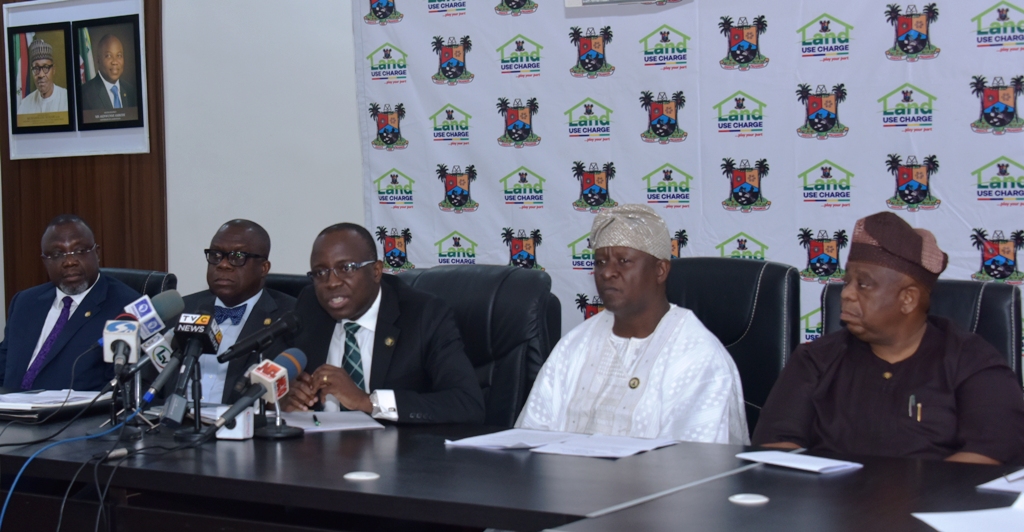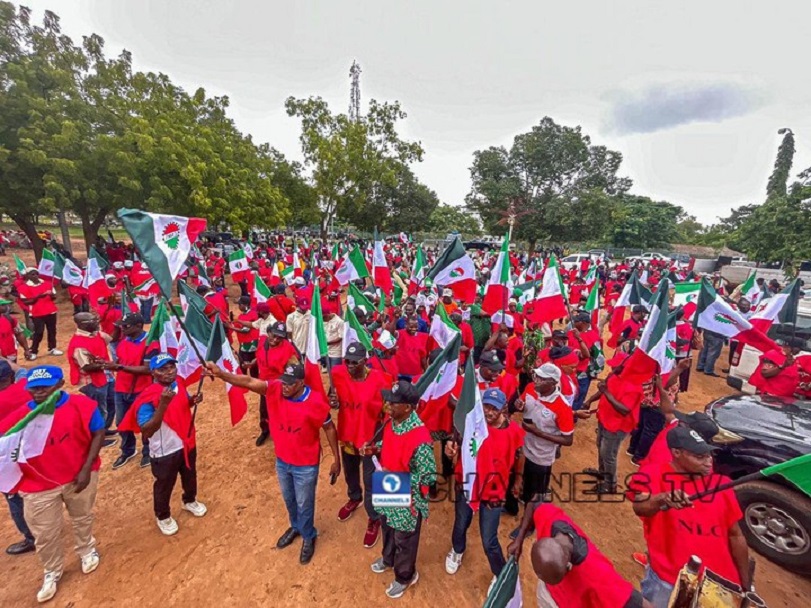General
Stakeholders Hail Ambode’s 50% Slash of Land Use Charge

By Modupe Gbadeyanka
Governor Akinwunmi Ambode of Lagos State has been commended for approving the downward review of the amended Land Use Charge Law 2018 to 50 percent for commercial property as well as other LUC waivers that will give economic succour to owners of property and taxpayers in Lagos State.
Lagos State Commissioner for Finance, Mr Akinyemi Ashade, at a media briefing on Thursday at the Baguda Kaltho Press Centre, Alausa, Ikeja, announced the slashing of the fee by 50 percent.
He explained that the “Lagos State government took this important decision for the good of the people” and as a government “committed to the welfare of its citizens and which understands the importance of continuously engaging the populace.”
In addition, Mr Ashade stated that the review to the amended LUC Law 2018, which was received with mixed feelings in the state, came as a result of widespread dialogue with stakeholders such as the Organised Private Sector, Nigeria Bar Association, Real Estate Investors & Developers, Landlord & Resident Associations, Community Development Associations, Civil Society Organizations, Lagos Chamber of Commerce and Industries (LCCI), Nigeria Institute of Estate Surveyors & Valuers and several other professional groups.
Furthermore, the Commissioner of Finance appreciated and commended property owners of all categories who have been performing their civic duties faithfully by paying the LUC.
“Consequently, as a result of these new measures, those who have paid the original amount will be awarded tax credits to the extent of the excess amount paid and carried forward to next year,” he said.
He also thanked Lagosians for their support and trust while encouraging them to participate effectively in the legislative proceedings.
“We appreciate you for trusting the current administration with the responsibility of investing the revenue from LUC in infrastructure renewal and overall development of our State. We promise we will continue to make your tax work for you,” the Commissioner said at the conference attended by members of the media in the state and other relevant stakeholders.
He disclosed that the after effect of the review of the amended LUC law means owners of property in Lagos State can now reap the benefits and waivers as follows:
COMMERCIAL PROPERTY OWNERS, who are undoubtedly the stakeholders mostly impacted by this amended Law will be granted 50 percent discount. This means a commercial property valued at N20 million which was earlier billed N91, 200 will now pay N45,600 per annum.
PROPERTY OCCUPIED BY OWNER AND THIRD PARTY & PROPERTY USED FOR INDUSTRIAL AND MANUFACTURING PURPOSES will now enjoy 25 percent discount. This means that a N20 million property expected to pay N30,720 will now pay N23,040 per annum.
OWNER-OCCUPIED PROPERTY will enjoy 15 percent discount. For a N20 million property, this used to be N9,120. Now, it is N7,752 per annum.
Additionally, the penalty regime for late payment of LUC has been waived completely. Therefore, LUC payers who have received their bills will no longer be penalized for late payment of bills issued in 2018, thereby providing additional relief to LUC payers.
Apart from the earlier stated ones, other rates and reliefs will remain unchanged and will be implemented as stipulated by the Law.
These include 40 percent general relief, 10 percent for 70 years and above, 10 percent for properties owned by persons living with disability and 10 percent for properties that are 25 years old and so on and so forth.
Owners of Property across all categories will now be allowed to make payments by instalments. This will help to reduce the burden of taxation on Lagos citizens.
Executive Director of Centre for Public Accountability (CPA), Comrade Femi Lawson, who was elated at the new LUC review, praised the administration of Governor Akinwunmi Ambode for its empathy with the people of the state.
“This review shows a government which shares in the pain and concerns of the citizens of this state. Not only did they listen to our agitations but also LASG took action to allay our fears and worries by bringing the LUC rates down and introducing some other tax burden relief measures. This is surely a pro-people government,” Comrade Lawson said.
Similarly, Mr Thomas Aderinola, a real estate investor in Lagos State, said the downward review of the amended LUC law by as much as 50 percent was a reassuring indication that the LASG is a listening government.
“Imagine this huge waiver of 50 percent. It shows that the state government is sensitive to needs and is working for the interest of the people. We all can see what Governor Ambode is doing in the state in terms of Infrastructural development,” he said.
More importantly, Mr Aderinola applauded the government for introducing some other waivers like the instalment payment and the newly set up People’s Tribunal to resolve LUC payment cases in the state.
“With developments like these, we will be happy to show our commitment to the growth of Lagos by paying our taxes as at when due,” he opined.
General
EFCC Grabs Three Suspects Behind Q-net Scam in Nigeria

By Modupe Gbadeyanka
Three persons believed to be behind the Q-Net scam in Nigeria have been apprehended by the Economic and Financial Crimes Commission (EFCC).
The suspects, who allegedly operated the scheme under the name Mighty Infinity Millionaire Limited, were arrested by officials of the agency on Wednesday, May 1, 2025, in Abuja.
They are Olaniyan Joshua, Oyetunde Julius Akano, and Victor Oluwale, and are currently undergoing interrogation.
A statement from the EFCC said the accused persons falsely claimed to be representatives of Q-net, a global e-commerce and direct selling company.
While Q-net has since denied any link with the suspects and their activities, investigations further revealed they were equally running a fraudulent university training in pavilions and under trees, offering fake Bachelor of Science degrees in Medicine, Nursing, Cybersecurity, Computer Studies, and Geology, among others with a false claim of affiliation with Quest International University, Malaysia.
Student victims were charged between N1.2 million and N1.3 million as registration fees from which the suspected scammers raked in hundreds of millions in proceeds of crime.
Earlier on March 24, 2025, the commission raided Q-net University at Compensation Layout, Gwagwalada, FCT, Abuja, and arrested 133 suspects.
General
Facebook May Leave Nigeria Over $220m FCCPC Fine, Others

By Modupe Gbadeyanka
Nigerians may lose access to the social media platforms operated by Meta, a report by the BBC has said.
If this happens, it will not be the first time social media users in the country have experienced such blackout.
Recall that in 2021, the Nigerian government banned Twitter after the platform removed a post by the immediate past president of the country, Mr Muhammadu Buhari, for violating its rules.
The embargo was lifted in January 2022 after seven months.
Last week, Nigeria’s Competition and Consumer Protection Tribunal on Friday ordered WhatsApp and Meta Platforms Incorporated to pay a $220 million penalty and $35,000 to the Federal Competition and Consumer Protection Commission (FCCPC) within 60 days over data discrimination practices in Nigeria.
The tribunal’s three-member panel, led by Mr Thomas Okosun, in a verdict last Friday, dismissed the appeal by WhatsApp and Meta Platforms Incorporated regarding the $220 million penalty imposed by the FCCPC for alleged discriminatory practices in Nigeria.
In a report, the BBC said Meta argued that if it is forced to pay the fine, its users in Nigeria may lose access to Facebook and Instagram.
“The applicant may be forced to effectively shut down the Facebook and Instagram services in Nigeria in order to mitigate the risk of enforcement measures,” the company said in the court papers.
If this happens, it may greatly affect content creators, who rely on the platform for earnings.
Facebook remains one of the most popular social media platforms in the country like TikTok and Twitter, now known as X after Mr Elon Musk acquired it.
Meta is battling with different fines in Nigeria, including a $32.8 million sanction from the Nigerian Data Protection Commission (NDPC) alleged Meta over data privacy laws, and a $37.5 million fine for unapproved advertising.
General
Workers’ Day: NLC Decries Deteriorating Standard of Living of Nigerian Workers

By Adedapo Adesanya
The Nigeria Labour Congress (NLC) has outlined demands to the federal government while expressing deep concerns over the deteriorating economic conditions of workers as the world marks the International Workers’ Day (May 1).
NLC President, Mr Joe Ajaero, said Nigerian workers are groaning because of poor pay as a result of the economic policies of President Bola Tinubu as well as growing insecurity and political interference in labour affairs across the country.
Mr Ajaero described the current state of the Nigerian economy as hostile to workers, noting that the removal of fuel subsidy, Naira devaluation and rising inflation have plunged millions of households into deeper poverty.
He maintained that the current economic trajectory has eroded the value of wages, rendering workers helpless and unable to meet basic needs.
“It is clear that the policies of the government, particularly the ill-timed and unstructured removal of fuel subsidies and the floating of the Naira, have pushed Nigerian workers and their families to the brink,” he said.
The NLC president reiterated the labour union’s position on the new minimum wage, stating that N70, 000 is the barest minimum that workers can accept under the current economic conditions. He argued that the amount, though still insufficient considering the skyrocketing cost of living, could serve as a starting point for negotiation.
He lamented the increasing hunger facing workers in the country, “We are hungry,” he said, adding that, “The minimum wage cannot buy a bag of rice. If you are sincere and you go to work every day, 20 days, your salary is gone on transportation.
“We are not asking for luxury. We are simply demanding a wage that allows a worker to live a dignified life, pay rent, feed their families, send their children to school, and transport themselves to work.”
He said that even this figure would need to be adjusted periodically to keep pace with inflation and market forces.
“If the government can effectively implement some of the measures they have put in place -such as the N70, 000 minimum wage, the CNG transport system, and the students’ loan- then one can say that the renewed hope idea is working. I think the foundation has been laid, but we need the real implementation of these,” he stated.
On energy and transport, he criticised the government’s failure to deliver on the promised palliatives to cushion the effect of subsidy removal. He cited the delay in rolling out Compressed Natural Gas (CNG) infrastructure and vehicles, which was supposed to provide affordable alternatives to petrol-powered transportation.
“They promised us CNG buses. Where are they? They promised wage awards. Many states have not implemented anything. The promises made last year have remained largely on paper,” he said.
He called on the Federal Government to accelerate the implementation of energy reforms, especially in the transportation sector, to alleviate the burden on workers who spend a significant portion of their income on transportation.
Mr Ajaero also raised concerns over the inconsistencies in salary payments and implementation of wage awards across various states and federal agencies.
He noted that many state governments have either failed to implement the approved wage increases or are paying workers below the agreed minimum wage, thereby violating labour agreements.
He pointed out that the disparities in the federal and state public service salary structures were unacceptable and called for immediate harmonisation, including a review of salary step progression and grade levels to ensure equity.
The NLC president further urged the government to reform the country’s tax regime, which he said unfairly targets the poor while allowing multinational corporations and political elite to evade taxes.
“It is only in Nigeria that someone earning N50, 000 a month is taxed heavily while the real billionaires are not paying their fair share. This system must change,” he said.
Additionally, the labour leader condemned the growing state of insecurity in many parts of the country, which he said not only affects productivity but, also, endangers the lives of workers, especially those in rural communities and high-risk professions.
He also criticised the decay in the health and education sectors, lamenting that many workers can no longer afford basic healthcare or quality education for their children. Turning to internal challenges within the labour movement, he decried the increasing political interference in union activities, particularly in Rivers and Edo states.
He accused state governors of undermining the autonomy of the trade unions, suppressing workers’ voices, and in some cases, promoting parallel union leadership to create division.
“In Rivers State, we are witnessing a complete breakdown of labour-government relations. Retirees are not being paid, union meetings are disrupted, and workers’ rights are trampled upon. In Edo, we are dealing with a crisis of leadership instigated by the state government,” he alleged.
He urged the federal government to call erring state governors to order and protect the rights of workers as enshrined in the Constitution to prevent the escalation of events in those states. He further stated the status of no May Day celebrations in the states still stands. He challenged the government to prioritise social services in its spending plans and cut waste in governance.
-

 Feature/OPED5 years ago
Feature/OPED5 years agoDavos was Different this year
-
Travel/Tourism9 years ago
Lagos Seals Western Lodge Hotel In Ikorodu
-

 Showbiz2 years ago
Showbiz2 years agoEstranged Lover Releases Videos of Empress Njamah Bathing
-

 Banking7 years ago
Banking7 years agoSort Codes of GTBank Branches in Nigeria
-

 Economy2 years ago
Economy2 years agoSubsidy Removal: CNG at N130 Per Litre Cheaper Than Petrol—IPMAN
-

 Banking2 years ago
Banking2 years agoFirst Bank Announces Planned Downtime
-

 Sports2 years ago
Sports2 years agoHighest Paid Nigerian Footballer – How Much Do Nigerian Footballers Earn
-

 Technology4 years ago
Technology4 years agoHow To Link Your MTN, Airtel, Glo, 9mobile Lines to NIN













